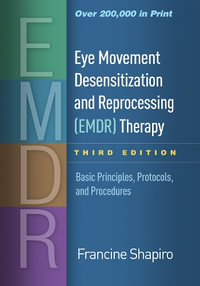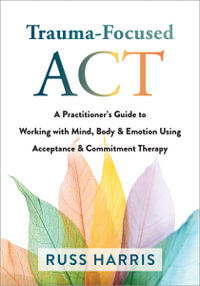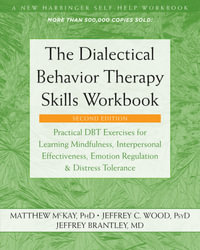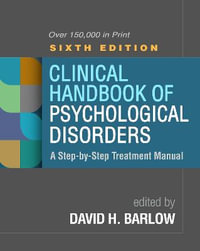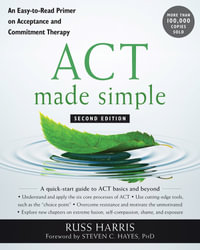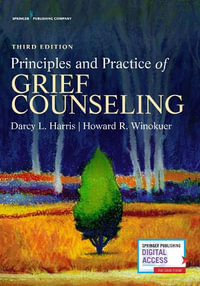This book is a first steps introduction to cognitive behaviour therapy that will appeal to the interested reader and professionals wanting to learn about the approach. It introduces you to the history of the approach, describes its behavioural and cognitive principles, and examines key techniques and methods within the context of contemporary practice. Further chapters on Formulation, Working with Imagery, and Future Directions in CBT help you to extend your learning, while reflective activities and case studies throughout the book support you to apply principles and perspectives to practice.
Industry Reviews
Corrie and Lane's 'First Steps in Cognitive Behaviour Therapy' outlines the basic concepts, techniques and widening applications of the most empirically validated form of psychotherapy. It is well written and easy to understand. The authors, both highly respected leaders in the field, have produced one the most accessible texts on the subject that I have ever had the pleasure of reading. A valuable resource with wide appeal to anyone interested in learning about CBT from the simply curious to HR practitioners, coaches and students. -- Dr Marc Kahn Sarah Corrie and David Lane present the first steps in CBT with remarkable and consistent clarity even when dealing with relatively complex topics. In my opinion, this is an excellent introduction to CBT and will be enjoyed by many students and trainees entering this field. -- Stuart Turner I've spent many years as a CBT Practitioner and read many books on the subject and for me this one really stands out. Why? - Because from the very start the authors of First Steps in Cognitive Behaviour Therapy form a relationship with the reader supporting their learning and understanding from beginning to end. This book is skillfully structured, beautifully written, and packed with examples and applications that relate to a wide range of contexts including `everyday living'. Care is taken to exclude no-one as each chapter of the book moves seamlessly through introductory principles and concepts, theory, research and practical applications. Whether you are an experienced or novice therapist, a coach, a professional from a completely different context, a potential or actual client, or none of these, the book is written in a way that all can relate to and apply to their own unique life - past, present and future. The exercises at the end of each chapter facilitate the reader in getting the most out of the book. They include getting to know how your mind works, analyzing your own behaviour, reflecting on experience, using imagery to help you achieve your goal, keeping a diary of how you spend your time and enabling yourself for the world of tomorrow. This is a shorter book than many on the subject, and I suspect that once you start reading it you won't want to put it down. What could be complex and dry material is presented in a powerful, lively, simple (but far from simplistic) way, and it cannot fail to touch its readers in ways that impact on their own lives and also others with whom they interact professionally or personally. I highly recommend this book by Sarah Corrie and David Lane. -- Professor Mary Watts * Review * This book is a new departure for Sarah and David. As highly qualified academics, they usually produce books and papers for those familiar with psychological topics. In this excellent book, they seek to help those of us less familiar with CBT to understand the principles on which it is built and the ways it is used effectively in practice. As I should have expected, they have written a book that is easy to read without dumbing down the academic rigor. Indeed, one of its real attractions is how they have made the book very accessible by using fictitious case studies drawn from their vast experience as practitioners. In addition, there are regular prompts for the reader to self-reflect on how they might apply the contents. They end with a brief look at where CBT may develop in the future. I highly recommend this book for any non-expert or lay person who is keen to gain better understanding of CBT for their own personal or professional lives. You will not regret the time taken in allowing Sarah and David to lead you gently to a greater understanding of CBT. -- Phil Moore * Review * This is an excellently well-written book, which introduces the history, key scientific and philosophical underpinnings; principles and practice of cognitive-behaviour therapy (CBT). The style is thoughtful and engaging. The authors achieve a sound balance of explaining concepts in a way which does not assume prior knowledge, but does not patronise the reader. There are illustrative examples of a range of situations which demonstrate the approaches being discussed. The book makes use of the principles described, by offering reflective learning activities, and signposting to further reading at the end of each chapter. It provides an up to date, engaging overview of the field, noting the core researchers and current developments which inform CBT. I would recommend this book to anyone starting training in CBT, as well as fundamental reading for therapists training in other orientations or schools of thought, mental health and well-being therapists, and as a core reference for CBT training programmes -- Helen Macdonald, * Review * Sarah Corrie and David Lane have provided a very timely and easy to understand book about Cognitive Behavioural Psychotherapy (CBT). The book should interest individuals and mental health professionals who seek knowledge regarding the workings of this scientifically developed and most successful therapeutic methodology in our time The book informs comprehensively for those who seek help, direction and suitable professional guidance. Both authors are clinical psychologists with extensive clinical and research experience. As pioneers, supervisors and practitioners of CBT they have contributed substantially to the development of this most successful therapeutic approach to date. Corrie and Lane take the reader through the complex development of CBT to what they call a family of therapeutic approaches as guided by behavioural and cognitive science. They describe how CBT was started as Behaviour Therapy by the early pioneers Hans Eysenck and Vic Meyer and many other psychologists discontent with available tradional methods to mental health problems offered by psychiatry and psychoanalytic approaches at the time. They outline a complex development that occurred in waves over several decades integrating and refining behavioural and cognitive methodologies and explaining how this led to the empirically established and evidence based therapeutic approach that continues to develop new specialised therapies (third wave) based on earlier developments (first and second waves). Next the authors give a detailed account how therapy intervention is designed and implemented as guided by behavioural and cognitive principles leading to respective methods. Finally, the concept and the highly important role of individualised case formulation in CBT is fully explained and demonstrated with a clinical case. This book should be a very useful guide for people looking for a therapeutic approach based on scientific principles but also for health professional in training and practice for psychotherapy. It is also highly recommended for any reading list with CBT training courses. -- Michael Bruch * Review * A beautifully written book: clear and easy to understand, and comprehensively covering the key principles and techniques of cognitive behavioural therapy. Fictional case examples bring components of CBT to life and reflective exercises provide opportunities to reflect on how to relate CBT principles to one's own life. Extremely useful for trainee cognitive behavioural therapists, and anyone interested in understanding what cognitive behavioural therapy is. -- Dr Lucy Maddox


